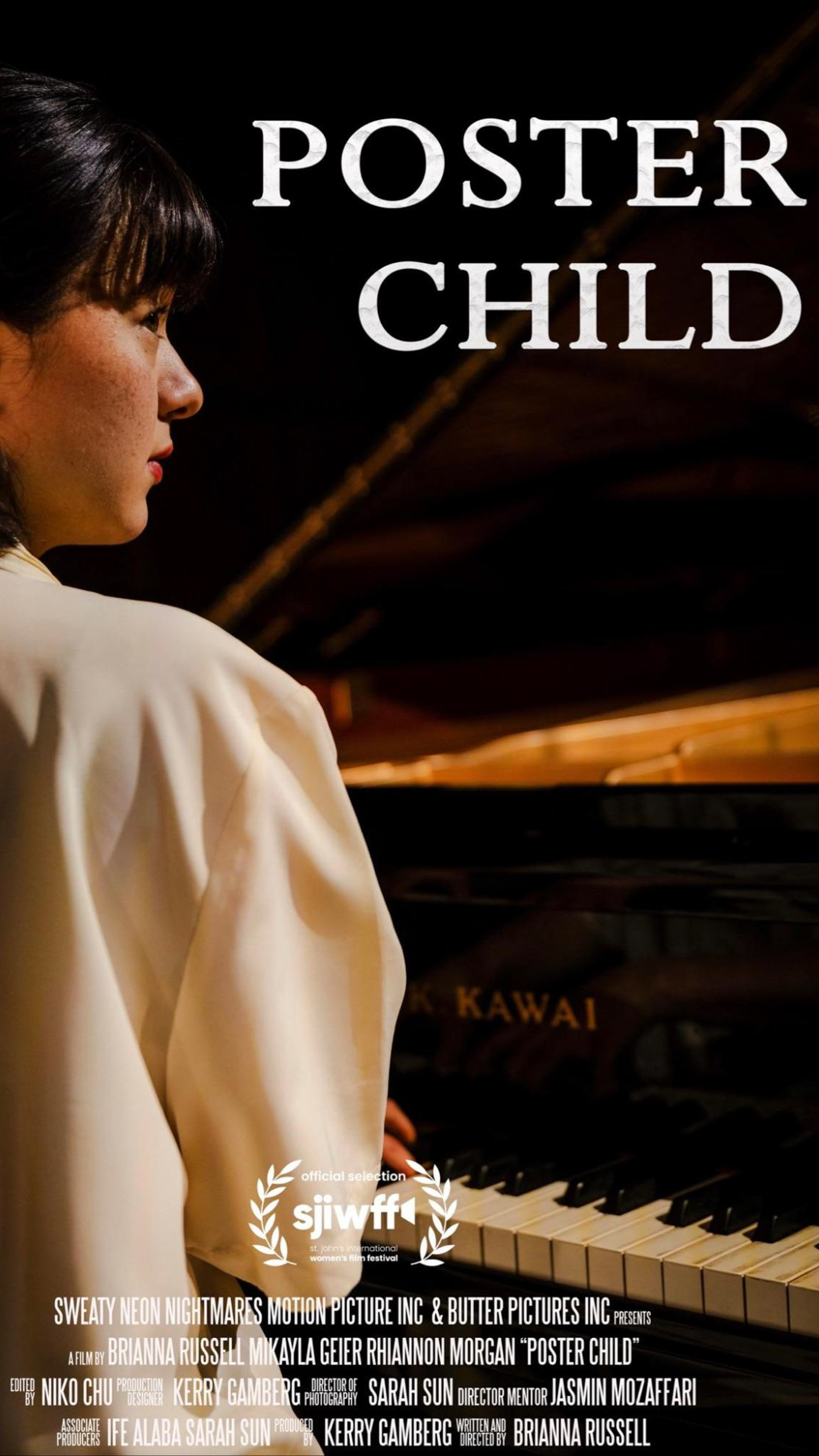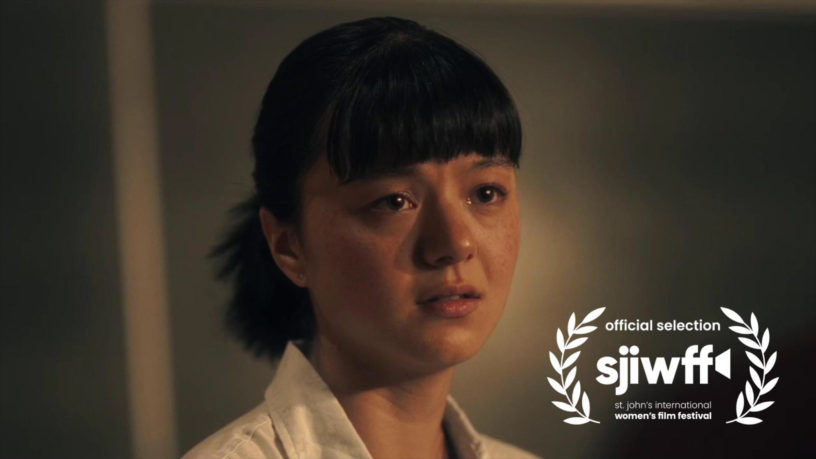By Abbie North
Toronto Metropolitan University (TMU) third-year film student Brianna Russell’s short film, Poster Child, is hitting the world screen at the St. John’s International Women’s Film Festival (SJIWFF) on Oct. 21.
Written and produced by Russell, Poster Child depicts the experience of an insecure, up-and-coming pianist as she replaces her childhood idol as the lead soloist at the most prestigious orchestra in the country after they get injured.
Drawing on personal experience, Russell spoke with The Eyeopener about the spark behind the idea for the film. “I had recently gone through a breakup and I was feeling really strongly at the time,” she said. “I wanted to over-exaggerate the relationship and blow it completely out of proportion, so I wrote a feature film.” Russell explained that the film touches on the themes of rejection, grief and lost opportunity rather than her relationship’s end.

The filming process for Poster Child, shot at Memorial University of Newfoundland’s School of Music, involved transporting film equipment from Toronto and flying out actors and crew members. It also included providing basic needs on set like food, housing and compensation for the cast and crew. As expected, film production costs money—and a lot of it.
Russell said that a student film faces multiple barriers even before filmmakers can begin production—the daunting task of securing funding can prevent a project from making its way off the page and onto the screen.
“I wanted to over-exaggerate the relationship…so I wrote a feature film.”
“Unfortunately, because I spend time as a producer, funding is often what I am thinking about when I’m writing the script,” said Russell. “I have to try really hard to get that out of my head because that’s not helpful in the creative process.”
Russell’s experience on numerous film sets—both in a school setting and through her time as CEO and president of Breathing Cloud Productions—has exposed her to the realities of getting financial support to fund her creative projects. When asked about the process of applying for funding, Russell highlighted the emotional turmoil she experiences when countless applications don’t turn up with results.
“It’s a lot of writing. It’s pages and pages of pitch decks and budgets and it’s exhausting…the most [applications] will get rejected,” said Russell. “That’s all your life is going to be in the business, is getting rejected over and over.”
The problem? Russell said no one seems to educate film students on where to find funding resources for their projects.
Sarah Sun, a third-year RTA student at TMU, is the director of photography and cinematographer for Poster Child. She oversaw the visuals of the short film, including lighting.
Sun said there is an advantage to being a student filmmaker, highlighting that although some TMU classes don’t always tell their students what opportunities exist outside of campus, there are people who want to build relationships with up-and-coming filmmakers.
“Unfortunately the school system itself doesn’t tell us as students that there are big companies who are willing to support us,” said Sun. “As a student, being in the system can be very difficult. It’s hard to get funding because no one knows where the funding is.”
TMU has funding resources and opportunities for creative students and both Russell and Sun highlight The Creative School as a solid starting point in finance and mentorship.
“It’s hard to get funding because no one knows where the funding is”
“We look [to] the Society of The Creative School for [a] potential 10k grant, after hopefully doing a very successful pitch, and after securing that we look outside of [the] school, either crowdfund or smaller initiatives,” said Sun.
However, Russell said film students have to look at funding bodies outside of TMU and take advantage of their support, naming the Canadian Council for the Arts, The Independent Production Fund for Web Series and Ontario’s Art Council as funding sources.
Russell highlights that financing as a film student is about getting your name out there, even though it’s likely you will not receive a response.
“You want to get your [project] in front of these juries as many times as you can; rack the odds up,” she said.
The budding filmmaker does see the silver lining of rejection. “Art is very human, and rejection is very human, and rejection fuels humanity, and humanity fuels art and that all works together,” said Russell.
According to Women in View’s On Screen Report 2023, there is a gap in access and amount of funding for men compared to women and gender-diverse filmmakers. In 2019, the average number of funding for male-run productions was just under $4,000 more than projects written by women and gender-diverse creators.
“Art is very human, and rejection is very human”
From her experiences working with men, women and gender-diverse creators on set and in projects, Sun highlighted the gap in the film industry in terms of representation and access to money. She said the disparity shows how few women are at the core of such a huge and influential field.
“I think statistically [funding] does go towards men more because there is already such a huge white male population in the industry, so naturally it just goes to them,” she said. “There’s so little women in the industry, just saying that over and over again puts that fear in yourself…I walk into a room, [and] even though I know I deserve to be there, I keep remembering that there are so little women.”
Last fall, Russell was awarded the RBC Michelle Jackson Emerging Filmmaker Award, a finance and mentorship award dedicated to women and gender-diverse filmmakers in Newfoundland.
She relived the moment she was awarded such a monumental award that fueled the creation of Poster Child. “I was standing in line at the bank, and I cried. I was with my mom, and I showed her [the] email with a shaking hand,” said Russell.
The award is valued at $35,000 which includes mentorship as well as $15,000 that went towards creating her short film.
“Brianna is the youngest recipient of the Award [and] we are very excited to have [her] film Poster Child premiering at our [RBC] Closing Night Gala,” said SJIWFF Executive Director Jenn Brown in an email to The Eye.
Featured in an international women’s film festival, Russell admitted that women, queer and gender-diverse creators are the people she feels most supported and comfortable around when creating her films.
“Everything is as big of a deal as it needs to be”
“Having a lot of women on set gives the opportunity to feel emotions without feeling persecuted by them,” she said. “We can cry, get upset, experience things, love each other and have these high emotions without being afraid of someone getting angry or upset. Everything is as big of a deal as it needs to be.”
Ahead of the premiere later this month, Russell reflected on the significance of being featured in the SJIWFF.
“To be at a festival surrounded by so many talented filmmakers, and especially women and gender diverse filmmakers, that’s really exciting for me,” said Russell.
Poster Child is set to premiere at the Majestic Theatre, opening for the film The Queen of My Dreams as part of the RBC Closing Night Gala on Oct. 21 at 7 p.m.










Leave a Reply